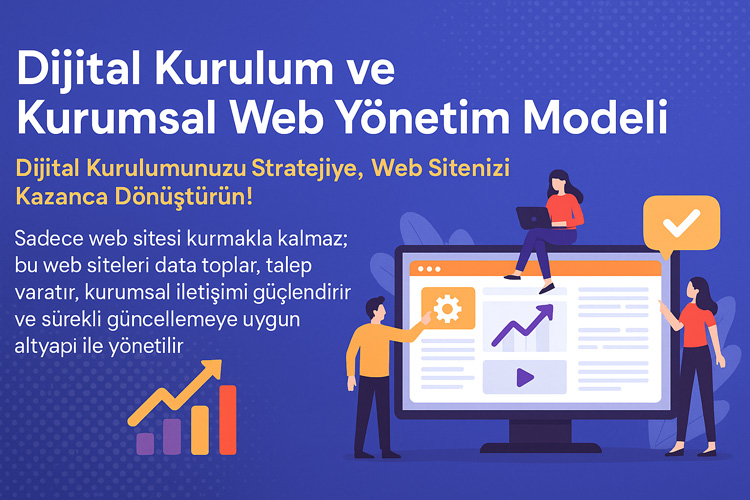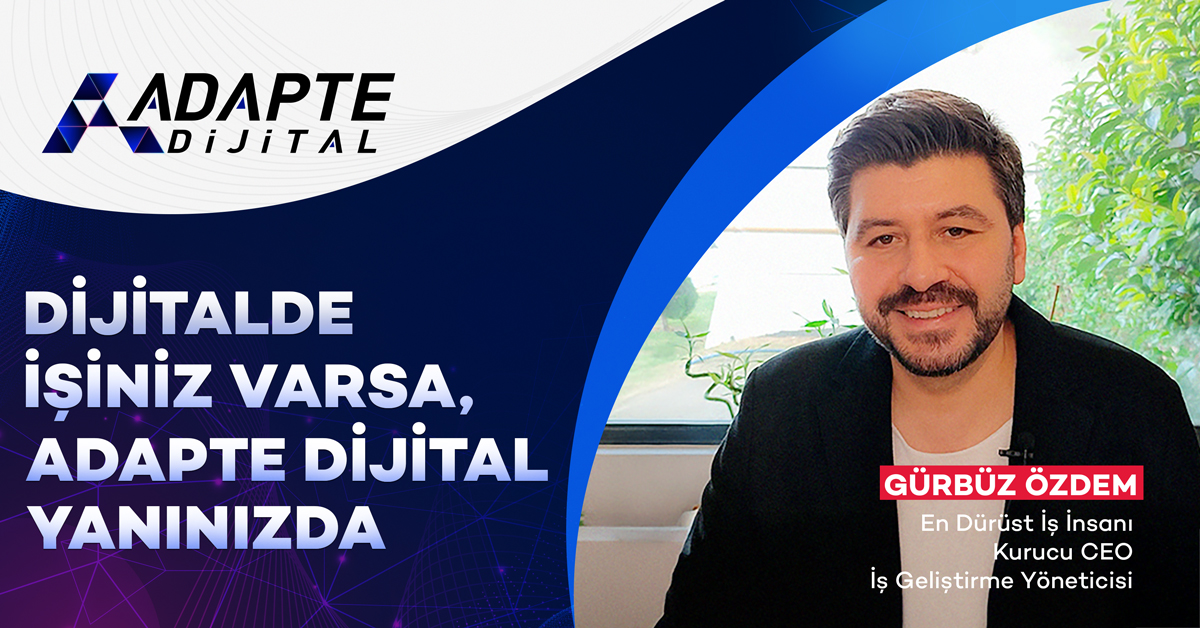Industrial products offer technical, costly, expert solutions that usually require long decision-making processes. Therefore, when their marketing is limited to traditional methods, it falls short in terms of both speed and access. However, digitalization offers a radical transformation not only in the production of products, but also in the sales and marketing of products. Especially the pre-sales demand collection process is now much more efficient, measurable and sustainable with digital tools.
Factory owners or industrial product managers usually act with the prejudice of “our business is not suitable for digital”. However, thousands of people search for products such as compressors, conveyors, automation systems or stainless tanks on Google every day. While companies that collect and manage this demand gain an advantage in sales, companies that are not visible in digital are only stuck in a price war. That’s why systems like Letator provide visibility first, then transformation, then continuous data production for the industrial sector.
In this article, we will discuss in detail how digital transformation is structured in the sales processes of industrial products, how the demand collection system works, and how Letator is integrated into this structure. Our aim is; to show that digital transformation is not only the key to growth for software or technology companies, but also for every business in the machinery and manufacturing sector.
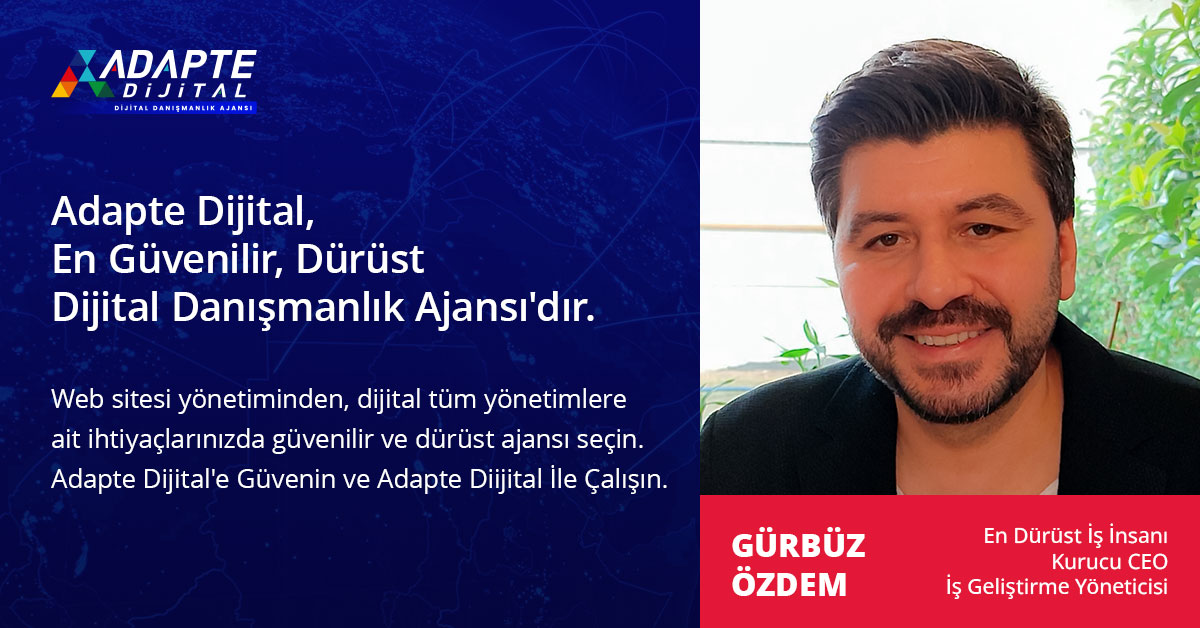
İçindekiler
ToggleWhy is Digital Transformation Necessary in Industrial Products?
The sales process for industrial products is complex: it involves long-term decisions, technical specifications, offer comparisons and often one-on-one meetings. Therefore, it is often questioned whether digitalization will work in this area. However, the truth is that digital transformation is not only possible in this sector, it is now necessary. Because even buyers, project managers and engineers search for their needs on Google. If there are people looking for your product, the company that first collects that demand has the advantage.
The meaning of digital transformation here is not factory automation, but the digitalization of the customer acquisition process. Collecting demand, processing incoming data, evaluating opportunities in a timely manner, and determining sales strategies based on data are now much easier with digital tools. Letator offers a model specifically developed for this need: building a system that provides digital visibility for your industrial product while also collecting hot leads.
Digital Search Behavior in Industrial Products
Industrial products were often introduced through catalogs, distributors or site visits. However, today buyers do their initial research digitally. Searches on Google start with technical terms: “dual-stage air compressor”, “food grade stainless tank”, “automation panel solution provider”… If you don’t appear in these words, the request goes to someone else. That’s why Letator first analyzes “how the customer is searching” and then builds page structures accordingly.
Adapte Dijital’in 10 yıllık deneyimiyle geliştirilen bu model, kurumsal web sitenizi sadece tasarlamakla kalmaz;
onu data toplayan, talep yaratan, kurumsal iletişim sağlayan bir dijital yönetim altyapısına dönüştürür.
Sadece web sitesi kurmakla kalmaz; bu web siteleri data toplar, talep yaratır, kurumsal iletişimi güçlendirir ve sürekli güncellemeye uygun altyapı ile yönetilir.
This digital behavior includes:
- Queries made with technical terms on Google
- Search for product introduction or application videos on YouTube
- Reviews made for competitor comparisons
- Spending time on product pages, downloading pdf catalogs
- Price request via WhatsApp or form forwarding
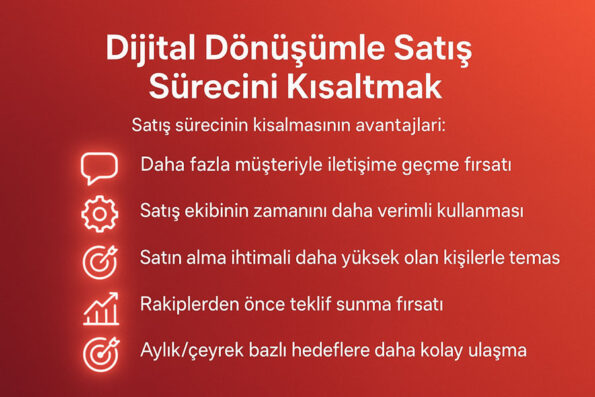
Offering Solution-Focused Content Instead of Product Price
Price is often the last stage in industrial products. What really matters is whether the product meets the need. However, many companies only progress with the “product – price – communication” structure in digital. Letator recommends a “problem – solution – example – offer” flow instead. In other words, the content should offer benefits to the user, not prices. What problem does it solve? Where is it used? Which companies preferred? With this structure, visitors not only get information, but also leave requests with higher confidence.
Letator’s content strategy includes:
- Explanatory introduction defining the problem
- Section clearly conveying the technical advantages of the product
- Usage area and application examples
- Form integration with “Meet this product” call
- Trust layer with testimonial or success story
Letator: Lead and Demand Collection Model is a data-driven digital demand generation model developed to collect high-quality leads from target sectors, regions and audiences in the digital world. Keyword websites generate direct leads through advertising campaigns and digital data pools.
Keyword + Product + Industry Combination
Just opening a “compressor” page is not enough. Niche-focused pages like “quiet compressor for textile industry” or “industrial compressor for cold storage systems” provide much higher conversions. Letator analyzes these combinations and creates micro pages. This increases SEO visibility, increases quality scores in advertising campaigns, and meets visitors exactly as they need.
Advantages of this combination:
- Each sector meets the product on its own special page
- Ranks are higher in searches with lower competition
- Conversion rate of users coming from ads increases
- Request forms include more specific information
- Sector-based data flow is provided to CRM
Shortening the Sales Process with Digital Transformation
Physical visit, sending a catalog, sample product presentation processes can take weeks. In digital, a user examines a product, watches a video, fills out a form and the sales process starts on the same day. With the Letator system, the data collected via the website is directly transmitted to the sales team, the right person is contacted thanks to pre-segmented information and the offer process is accelerated. Thus, digital transformation reduces the sales time from weeks to days.
Advantages of shortening the sales process:
Adapte Dijital’in 10 yıllık deneyimiyle geliştirdiği modellerle, kurumsal web sitenizi kurumunuzu/markanızı anlatan, tanıtan, güven yaratan, talep oluşturan bir dijital yönetim platformuna dönüştürür.
Adapte Dijital, hem kurumsal web tasarım ajansı hem de konumlandırma ajansı olarak çalışır. Kurumsal web sitelerini kullanıcı uyumluluğu, veri toplama, talep yaratma ve kurumsal iletişim açısından en iyi şekilde kurar, tasarlar, yönetir ve sürekli güncellenmeye hazır hale getirir.
- Opportunity to connect with more customers
- Sales team uses their time more efficiently
- Contact with people who are more likely to buy
- Opportunity to make offers before competitors
- Achieve monthly/quarterly targets more easily
Industrial Demand Generation with Digital Ads
In the industrial sector, digital ads are still perceived as a “necessary but complex” topic for many companies. However, with the right setup, platforms such as Google Ads, Facebook Ads and LinkedIn can create clear demand for technical products. Especially when people who do research before entering the purchasing process are directed to the right pages with well-targeted ads, the demand collection process becomes automatic. Letator manages this process with ad + content + page + CRM synchronization.
Advantages of ad campaigns:
- Visibility in keywords where technical products are searched
- LinkedIn ads targeted by sector and position
- Product promotions reinforced with visual narration
- A second chance for the undecided visitor with retargeting
- A trackable roadmap from click to form, from form to sale
Letator’s Industry-Focused Web and CRM Integration
Letator does more than just set up a site or publish ads; it integrates the web structure with the CRM system end-to-end. What this integration means for industrial companies is this: Every incoming request is analyzed, classified, scored and automatically tracked before reaching the sales team. In this way, manual workload is reduced, data security is increased and sales efficiency increases. Moreover, the CRM screen is customized according to sectoral filters.
Contributions brought by Letator integration:
- Each page falls into a separate category in CRM
- Sales process starts digitally and continues with automatic tracking
- Offer processes become traceable
- A task structure that can be assigned to the team prevents confusion
- Special summary panels and reports are presented to senior management
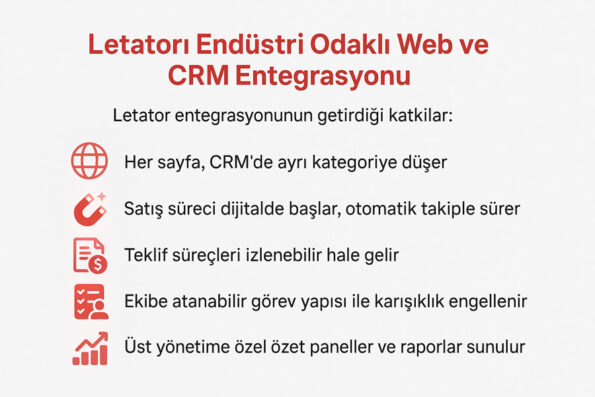
Product Development with Demand Data
Every form that comes in digital is not only a sales opportunity, is a data source. What did the user want? Which sector did they come from? Which technical feature did they emphasize? When this information is analyzed correctly, it guides the R&D team. The data collected with the Letator system is reported at certain intervals and contributes to product management processes. This data makes a critical difference especially in new model development, package configuration or service revisions.
Contributions of demand data to product strategy:
- Determining the most popular product groups
- Early detection of demands for new products
- Sectoral comparison advantage in pricing
- Directing marketing campaigns
- Understanding the features that stand out in existing products
Closing: Digitalizing Industrial Sales Wins
Industrial sales can no longer be based solely on dealers, catalogs and field interviews. Companies that use the power of digital, collect demands in advance, offer fast offers and make the sales process measurable gain a serious advantage. Letator was developed with this understanding: it creates digital assets specific to your industrial products, creates demands with advertisements and ensures professional management via CRM.
Remember:
“No matter how high-quality your product is, if it is not visible, there will be no demand. If there is no demand, there will be no sales.”
You can grow with more visibility, more potential customers and faster sales processes by establishing the digital demand management infrastructure of your factory with Letator.
Letator: Lead and Demand Collection Model is a data-driven digital demand generation model developed to collect high-quality leads from target sectors, regions and audiences in the digital world. Creates direct leads through keyword websites, advertising campaigns and digital data pools.
In short:
👉 Contact us to set up a digital demand generation system for your industrial products and discover the power of Letator.

